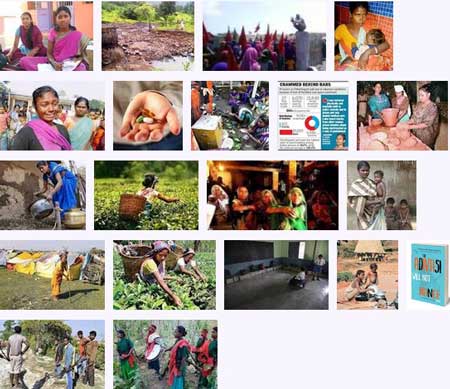
“We have to write our own stories, about our issues, from our own perspectives.” – Abhay Xaxa, a “Fiercely Unapologetic Adivasi Scholar-Activist” | Read more >>
Learning from each other and telling stories is more than doing things the way they were done in the past. Like other researchers, Todor Proykov, officer at RIPFA (Research in Practice for Adults) at Dartington, is “discovering that people respond to the power of stories far better than to concise Powerpoint bullets”:
The idea of using stories is very much at the cutting edge of social work knowledge exchange at the moment. Stories deliver messages that really stick with people. The form is as important as the content and the personal aspect of the story is essential – the best learning comes when there is a strong personal identification with what is being related. […]
Enabling people to learn from each other opens up the possibility of creating learning organisations – where people are learning from each other every day at every level. […]
It seems like going back to the way things were done in the past – learning by telling stories, learning by hearing how other people did things. But now with the addition of email and the internet this becomes much more powerful as long term learning groups can form regardless of location.
Note: Dartington Trust in Totnes (Devon, UK) is an institution established to promote the Arts, Social Justice and Sustainability. It was founded by Leonard and Dorothy Elmhirst and inspired by Rabindranath Tagore (1861-1941), Asia’s first Nobel Prize awardee who worked towards education for all in combination with rural development. Tagore stayed at Dartington Hall during his European tour in 1930.
Source: Scene magazine, Issue one, Spring Summer 2010; published by The Dartington Hall Trust (Dartington Arts, Social Justice, Sustainability), Totnes, April 23, 2010 p. 18
URL: https://issuu.com/dartington/docs/scene-1
Date Visited: 6 February 2021
“Cover Your Country” by PARI: Rural people speak about their lives through photos, narratives, film, and audio materials >>
Video | “I saw women working 90 per cent of the time. They did backbreaking jobs for which you need an erect spine,” says P. Sainath in Visible Work, Invisible Women: Bricks, coal and stone | RuralIndiaOnline.org >>
In Marginalised but not Defeated, Tarun Kanti Bose (a seasoned public interest journalist) asserts that “the mainstream development paradigm is being questioned and new rainbows of collective, community reassertions are happening across the tribal belt in India. More so, in most cases, led by brave, empowered and resilient women.” | Learn more: https://countercurrents.org/2023/05/book-review-marginalised-but-not-defeated >>
“In less than 200 years, photography has gone from an expensive, complex process to an ordinary part of everyday life. From selfies to satellites, most of the technology we use and spaces we inhabit rely on cameras. […] While photographic documentation can aid in shaping history, it can also be a window into the horrors of the past.” – Read more or listen to Butterfly Effect 9 – The Camera on CBC Radio Spark 26 May 2023 >>

Indian magazines and web portals >>
See also
Adivasi Academy & Museum of Adivasi Voice at Tejgadh | Lecture “A View of Higher Education in India”
Appropriate education for Adivasi children – the Vidyodaya School model at Gudalur
Childhood | Children’s books | Childrens rights: Education | UNICEF India | Safe search
People’s Linguistic Survey of India | Volumes (PLSI) | PeoplesLinguisticSurvey.org
Multi-lingual education | Residential school | Ekalavya
Multilingual education is a pillar of intergenerational learning – Unesco
Santali education | Teaching Santal children by Boro Baski
Unesco | Unicef | Unicef India | United Nations
United Nations International Days and Weeks
Video | “Nations don’t make us human – languages make us human”: Ganesh Devy
Women | Safe search | President Droupadi Murmu on women’s empowerment